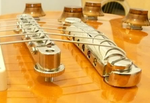mightyjoeyoungxnj":1szvd5s9 said:
Ratou":1szvd5s9 said:
yeah i figured you did that already

Just saying in case!
By curiosity what string gauges are you using for C#?
I recently went up a bit to 11-54. I've still had the issue, MAYBE less so - hard to tell since it is a randomly fluctuating issue; recently ran out of 11-54 so I believe the current gauge is a tad thinner.
Also, would this happen with strings that are worn out?
Another issue this guitar has had since day one would be the speed at which is eats new strings! I swear I can strum the thing after 1.5 rehearsals (1.5-2 hours each) and the strings will be dead rubber bands. Totally perplexed by this thing yet it sounds too good to axe.

I even remember installing new strings years ago before a show and having them dead right after our set was finished lol.
Joe
You have some odd issues.
Strings going dead after 1.5-2 hours?
I wouldn't blame the guitar as it can't wear strings like that, unless the frets are made of sandpaper, and even then.
Players who's strings don't last very long tend to have very acidic sweat.
One of my playing buddies has this problem. He goes through strings VERY quickly, about 4 times faster than me and other typical players. He's played some of my guitars and the next day when I go to play one there is an odd feel on the strings like some kind of residue left by his hands/sweat.
Try wiping down your strings at least every time you pause or take a break.
If your case is really bad, you may want to wipe the strings down after every song.

I wonder if you're corroding the strings so badly that they are slightly shrinking, thus going sharp.
Strings going sharp is kind of odd. Is it all the strings going sharp, or a couple always the same? If all, do they go sharp evenly, meaning a chord is in tune but sharp?
For a string to go sharp something has to be putting more tension/force on the string than where it started.
The strings going colder than when you start can shrink and thus go sharp. But, you're playing so it's odd that cold would be affecting them. Plus cold affects metal and wood.
Your bridge somehow moving back? But again, how odd is that?
Nut bind, on a guitar not your underpants

usually results in the same string or couple stings going flat once the nut friction lessens or loosens and the string releases tension making it go flat not sharp. Nut bind usually lends to strings going flat, rarely sharp.
Releasing tension yet going sharp is one big oddity.
So, what about your truss rod?
You mentioned that when you went to a higher gauge string the tendency to go sharp lessened.
The truss rod typically works against the strings tension. If the truss rod, for some reason, has greater pull than string tension, which could be as you tune down, then it could be pulling on the neck making the neck go flatter and thus adding pull to your strings, which would make them sharp. Still, doing that after a few songs is odd, as you would expect it to stabilize after some time.
Check the truss rod and make sure the neck relief is properly set WITH the strings you are using and with the tuning you are using.
If you adjust the truss rod with lighter strings at standard tuning, and then you drop tune greatly you now have less string tension working against the truss rod, which would allow the truss rod to pull the neck flatter and cause the strings to go sharp.
Something to consider at least.

Good luck. Let us know if you find the problem.

